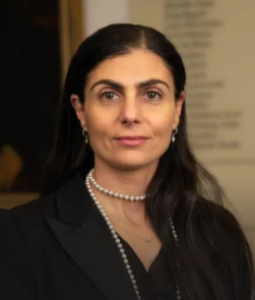Maria Karaiskos KC – Church Court Chambers
 Maria Karaiskos, who was appointed King’s Counsel in 2023, both prosecutes and defends in the most serious, sensitive, and complex criminal offences including murders, historic rapes, child abuse, high-profile sexual offences, road traffic fatalities, multi-handed drug conspiracies and international importations.
Maria Karaiskos, who was appointed King’s Counsel in 2023, both prosecutes and defends in the most serious, sensitive, and complex criminal offences including murders, historic rapes, child abuse, high-profile sexual offences, road traffic fatalities, multi-handed drug conspiracies and international importations.
As Church Court Chambers’ first female silk and first ‘home-grown silk’, Maria recalls her first day in pupillage in her earliest set of chambers 3 Temple Gardens: That evening at after-work drinks, Maria was told by a venerable senior colleague that they had “never had a Greek in chambers before.” Even in this day and age, people did not always bother to learn how to pronounce “Karaiskos” correctly – “it wasn’t that difficult!”
Maria’s parents had come to the UK in the 1960s where they met – unimpressed by both the British weather and food, married and had four children.
Maria has two young children, who are the centre of her life and always come first. Motherhood has its challenges, of course, for an extremely busy senior junior, and now silk, but it is doable: It is very much a question of transferrable skills, as any mother of two junior school youngsters knows well, you have to be incredibly well organised and a great time manager. However, being woken up at 3am by a child who has had a bad dream the night before a big criminal case opened, is never much fun!
King’s Counsel had never really been in Maria’s sights. Apart from anything else, she had never felt worthy of the distinction, she said. And even when it seemed like a credible aim, some of her colleagues suggested that it would not be possible for her to combine motherhood with being a silk, and that Maria was too young to apply. Maria’s appointment to KC gives the lie to such views.
There is of course no age bar to silk, nor indeed any other sort of bar based on personal characteristics. KC Appointments ‘KCA’ have funded a good deal of work by the professional bodies to help eradicate barriers to greater diversity in silk and have a major ongoing outreach project underway. If you have the necessary experience and high-level cases of substance as an advocate, you are fully entitled to apply for KC. Fortunately the negative voices were outnumbered by peers and colleagues who provided great encouragement to Maria.
Applying for silk was extremely time-consuming, the application form comprising over 60 pages and you need to ensure that the cases you selected (and the potential assessors in the cases) speak to all the competencies at the necessarily very high level of excellence. Maria printed off the KCA Guidance for Applicants which she found extremely helpful. Maria had not expected to get an interview on her first attempt applying for silk, let alone be ultimately successful. Given her practice area, her cases did not often get her into the most senior courts. She was also concerned that she might not have a sufficient number of cases as during the previous few years there had been other competing demands on her time, not least from being a mother (e.g., needing time off during school holidays) and as she also sat as a Recorder in the Crown Court and a District Judge in the Magistrates’ Court. The Guidance helped greatly in this regard and, evidently, Maria’s cases were sufficient in number and in quality, ticking all the necessary boxes as set out in the competition’s Competency Framework. Frequently, a case – even an ostensibly ‘ordinary’ one – provided evidence of two or more of the competencies at the necessary level of excellence. One such case sparked a very interesting conversation in the interview as it involved an unusual, complex point of law.
Having got an interview, Maria was determined to give it her very best shot. She ensured that she was thoroughly familiar with her application form. A barrister friend in another chambers, a public law specialist and a silk appointed the year before, helped Maria with the application process and in preparing for the interview. Maria found this incredibly supportive and helpful. The interview took place in September 2022. The Panel were engaging, warm and interested in her application from beginning to end. The interview was challenging but enjoyable.
Getting the good news was “such an unbelievable feeling” and Maria was delighted at receiving so many texts, letters and messages from people both within and beyond the profession congratulating her on her elevation to silk.
Being a silk, in a sense, means more of the same as being an extremely busy senior junior, but with the considerable added responsibilities and demands of always being the leader and the person to whom colleagues and the Court looked to for the wisest counsel. At first Maria had to overcome a sense of imposter syndrome but she knew that she simply had to let her hard work speak for her. Being an advocate has never been a 9 to 5 job; it is all-consuming and vocational. You endeavour to compartmentalise the work from the rest of your life, but in practice it is not always so easy to put out of mind the traumatic things you hear, see and read about in your cases and on the bench. Maria thinks there is not sufficient support available for the self-employed bar to prepare the lawyers for, and to enable them to healthily process, some extremely difficult and unpleasant material. It is very difficult to “live in the moment” and switch-off as a 24-7 advocate, but you have to try to do so otherwise your mental health can suffer.
Maria had not always wanted to be a barrister. Her first love had been tennis but, she said, “I was not quite good enough”. She also had a yearn to be an actor. It is a truism well-known that advocates share many of the skills of the actor: public speaking, engagement with your audience and, not least, having to be “believed in”. Maria has always loved the law – she did her LLB at University College, London – and also greatly enjoyed public speaking, so a career at the Bar was a natural choice. She enjoyed studying a wide range of areas of law, from taxation to landlord and tenant, from property law to environmental law, but it was her love for criminal law and criminal evidence that led her to the criminal Bar.
Maria relishes jury trials and she has a massive respect for jurors, especially having undertaken jury service herself. She understands what an important civic responsibility it really is. Similarly, Maria’s professional respect extends to everyone who works in the criminal justice system, from Court room staff, Probation officers, the other advocates, and prison staff – they all worked so extremely hard in what is a challenging system.
Maria considers that she has a responsibility to act as a role model for younger colleagues. She is very proud of the profession’s ethos whereby people put forward the sort of help from which they themselves have benefitted. Alongside the additional demands of being a new silk, Maria intends to continue with voluntary work on a grass-roots level: attending schools to discuss the law, offering work experience assignments, speaking on panels for aspiring pupils, mentoring younger female barristers and sitting on working groups for those less represented in the profession. Maria continues to invite students to shadow her in her positions as a Recorder and Deputy District Judge to “see the Court from the front” and – particularly in the Magistrates’ Court – to witness the law in action at a raw, visceral and unfiltered level. For her own part, Maria finds that sitting as a Judge enriches her work as a silk, adding perspective to the role. For similar reasons, she likes to both prosecute and defend in cases: “It gives me balance, as I get to see a trial from every vantage point”.
Maria wished to emphasise how extremely useful she had found all the material available to applicants (and assessors) on the KCA website. This – along with the assistance from friends and her friend in silk – provided all that Maria needed to navigate the competition’s complexities and demands and for her to succeed at her first attempt. She also found the electronic forms to have very high and helpful functionality, significantly better than those available in some other organisations.
Maria’s father (almost 80 years old) saw his daughter take silk at the historic KC ceremony in Westminster Hall, clearly an extremely proud day for him. Sadly, Maria’s had mother died some years ago so that necessarily added a certain poignancy to the day. Maria’s children were allowed a day out of school for the day of the ceremony. Her little boy (then aged 6) told his teacher and classmates “I am going to see King Charles!”. The children loved the big posh Rolls Royce which was hired for the ride to Westminster Hall and then the Royal Courts of Justice for the afternoon as part of the day’s celebrations: “everybody looked at mummy’s lovely outfit!” Her daughter was also very up on the protocol, pointing out when some of the new silks bowed the wrong way!
- Date: December 18, 2024
- Category:

